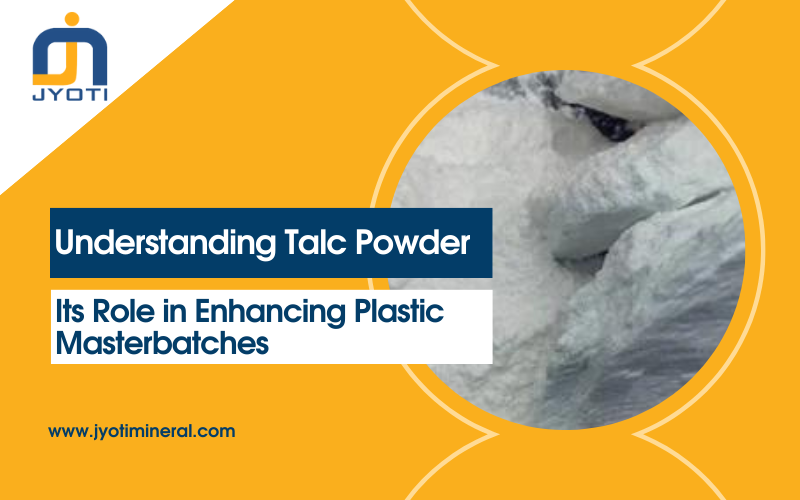Fillers play a vital role in plastic manufacturing to enhance plastic masterbatches. Among the principal fillers is talc powder due to its unique properties and advantages. Talc is a natural mineral that finds wide application in plastic filler masterbatches to enhance the mechanical and thermal performance of plastic materials. This article explains the significance of talc powder for plastic filler masterbatch, its advantages, and its application in the plastic industry.
What is Talc Powder?
Talc is a hydrous magnesium silicate mineral that is mined from the earth and processed into a fine, soft powder. It has a layered structure, making it highly suitable for use as a filler in plastic masterbatches. Talc powder is known for its smooth texture, high thermal resistance, and excellent barrier properties, making it an ideal choice for plastic applications.
Why talc powder is used in plastic filler masterbatches?
Using talc powder in plastic filler masterbatches results in a smoother and more uniform surface finish. This improves the overall appearance and quality of the final product, making it more appealing to consumers.
1. Enhances Mechanical Properties
Talc powder increases the stiffness, strength, and shock resistance of plastics. When blended with plastic filler masterbatches, it raises the strength and reduces the flexural tendency, such that the end product is more resistant.
2. Enhances Thermal Stability
Plastics treated with talc powder exhibit higher thermal stability, allowing them to withstand high temperatures without losing their shape or strength. This property is particularly beneficial in applications where heat resistance is essential.
3. Reduces Shrinkage and Warping
Talc powder helps minimize shrinkage and warping in plastic products by maintaining dimensional stability. This is particularly important in injection molding processes where precision and consistency are required.
4. Improves Surface Finish
Applying talc powder during the manufacturing of plastic filler masterbatches smooths the surface finish and makes it even. This improves the quality and appearance of the final product, hence becoming more appealing to customers.
Applications of Talc Powder in Plastic Industry
Talc powder is widely used in various plastic applications due to its versatility and effectiveness. Some of the common applications include:
1. Automotive Industry
In the automotive sector, talc powder is used in manufacturing bumpers, dashboards, and other plastic components. It improves the rigidity and heat resistance of these parts, ensuring better performance and longevity.
2. Packaging Industry
Talc-filled plastics are commonly applied in packaging such as containers, bottles, and caps. The incorporation of talc powder makes such packaging materials stronger and longer-lasting and hence allows them to withstand wear and tear more effectively.
3. Electrical and Electronic Components
Talc powder is employed to produce home products such as furniture, containers, and domestic appliances. It provides these products with additional strength, stability, and protects them from damage and heat.
4. Electrical and Electronic Components
In the electronics industry, talc powder is used to manufacture insulating materials and electronic components. It improves thermal conductivity and electrical insulation, ensuring the safety and reliability of these products.
Advantages of the use of Talc Powder in Plastic Filler Masterbatches
How Talc Powder Enhances Plastic Masterbatches
Talc powder complements the plastic in masterbatches to enhance the material’s strength and quality. Due to the fine particle size of talc powder, it blends evenly in the plastic, resulting in higher quality and consistency in the end product.
Choosing the Right Talc Powder for Plastic Masterbatches
Selecting the appropriate grade and quality of talc powder for plastic filler masterbatch is essential for achieving the desired properties in plastic masterbatches. Factors such as particle size, purity, and chemical composition play a significant role in determining the effectiveness of talc powder in enhancing plastic performance. Manufacturers should collaborate with reliable suppliers like Jyoti Mineral Industries to ensure they get high-quality talc powder that meets their specific requirements.

